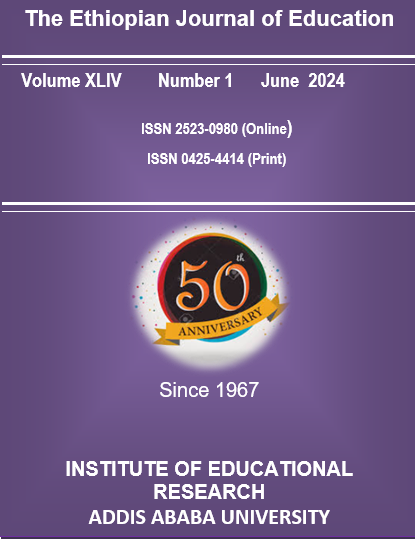Redressing Gender Inequality in Academic Rank and Leadership at Addis Ababa University
DOI:
https://doi.org/10.63990/eje.v44i1.10029Keywords:
Gender, inequality, academic leadership, academic rank, empowermentAbstract
This study was aimed at assessing the status of gender inequality in academic leadership positions and academic rank in Higher Education institutions of Ethiopia with a focus on Addis Ababa University, and it then suggests interventions in view of sustainable development. A descriptive survey design with qualitative and quantitative approaches was employed. The total number of participants consulted was 444. Of these, 43.2 per cent were women. The data were collected from all colleges and two institutes of technology through questionnaire and semi-structured interview guides. Purposive sampling was used to select top-level and central academic leaders, colleges and institutes which have female leaders currently, while availability sampling was used to select middle and first-line management and women leaders. A stratified sampling technique was employed to select instructors for the study. The subjects were selected randomly based on the willingness of leaders and instructors. The data collected were systematically organized and analysed. The findings indicated that women's engagement in academic leadership was low, and the majority of women faculty remained as lecturers or assistant professors in their academic careers. Women's academic advancement (progress to higher qualification and rank) and leadership positions were impeded by a lack of appropriate information to make decisions. Institutional, societal and individual factors were found to hinder women faculty members’ engagement in academic leadership positions and career advancement. Gender equality is far behind the policy intentions and achievement of sustainable development goals. It is suggested that the University as the oldest and established flagship university should reinvigorate by developing new sets of values and innovative strategies towards achieving the sustainable development goals, and play a leading role for the higher education sector. Revising policies and re-designing strategies and special programs and initiatives including doctoral and post-docs, carrying out rigorous gender main-streaming implementation and institutional transformation are suggested.
Downloads
Downloads
Published
How to Cite
Issue
Section
License
Copyright (c) 2024 Jeilu Oumer, Mekdes Yilma

This work is licensed under a Creative Commons Attribution 4.0 International License.


